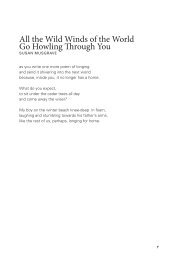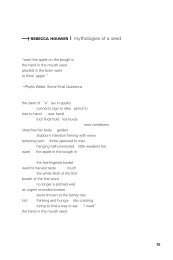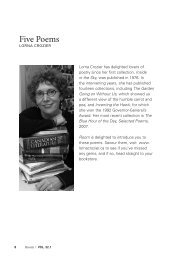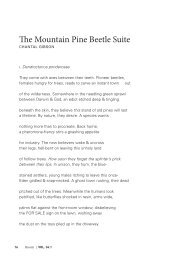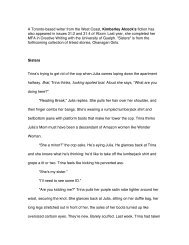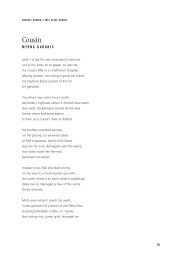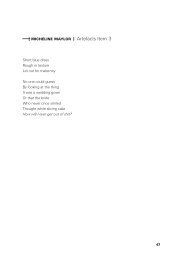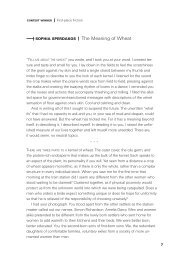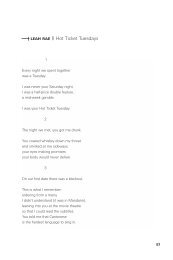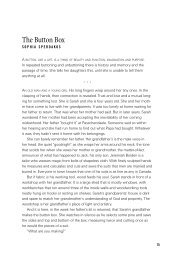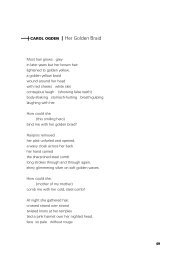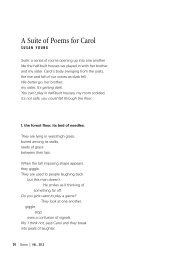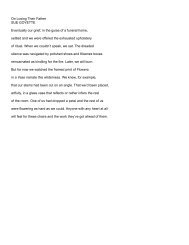Sample of creative non-fiction from 32.3 - "Amah ... - Room Magazine
Sample of creative non-fiction from 32.3 - "Amah ... - Room Magazine
Sample of creative non-fiction from 32.3 - "Amah ... - Room Magazine
Create successful ePaper yourself
Turn your PDF publications into a flip-book with our unique Google optimized e-Paper software.
earned <strong>Amah</strong>’s trust and <strong>of</strong>fered the support I wished I could give her. In<br />
the middle <strong>of</strong> winter, thin, blond Joanne would help <strong>Amah</strong>, increasingly<br />
arthritic, into her second-hand Saab, which smelled <strong>of</strong> cigarettes, and drive<br />
her to Loblaws, or the bank, or Little India.<br />
One holiday, <strong>Amah</strong> began rubbing her knees and told my father that<br />
the flights <strong>of</strong> stairs had become too much. Whenever I was at home I sat<br />
at the foot <strong>of</strong> her wicker chair and rested my head on her legs, <strong>of</strong>fering<br />
to massage them. After all, it was my growing up that led to her redundancy.<br />
When I went back to England, it was Joanne’s idea that <strong>Amah</strong> join<br />
the South Asian Women’s Association. Joanne drove her to a community<br />
centre near Bloor and Lansdowne once a month. After the tenth time <strong>Amah</strong><br />
told Joanne and my father that she didn’t want to go back. Why waste her<br />
time with a bunch <strong>of</strong> old women gossiping about their husbands, she said.<br />
Hers was already dead. Anyway, he was someone she would rather forget.<br />
<strong>Amah</strong> returned to her basement room, the monthly remittances to Rita, and<br />
her daily contact with love—Joanne.<br />
Dad told me he was letting go <strong>of</strong> <strong>Amah</strong> in the fall. The ivy covering the<br />
house had turned and the neighbourhood’s nannies were busy seeing their<br />
wards <strong>of</strong>f to school. <strong>Amah</strong> didn’t want to go back to India. At twenty-three,<br />
I didn’t want her to go either. I resented my father for forcing her retirement<br />
after two decades <strong>of</strong> service. She was my grandmother, our responsibility—<strong>Amah</strong><br />
to countless neighbours and friends. How could she be sent<br />
away? But there was no choice. Even though she had savings, she couldn’t<br />
manage an apartment on her own. <strong>Amah</strong> had no other friends and family<br />
in Canada. No network beyond our house, the 7-Eleven and the discount<br />
shops on St. Clair and Gerrard where she would haggle for goods. But<br />
there was another reason she had to leave, more painful than the logistics<br />
<strong>of</strong> surviving on her own. I too wanted my own life, and there was no room<br />
for my nanny in a grown-up world. I related to Rushdie’s narrator in “The<br />
Courter”: “For years now I’ve been meaning to write down the story <strong>of</strong><br />
Certainly-Mary, our ayah, the woman who did as much as my mother to<br />
raise my sisters and me.” Twenty-three years after immigrating, <strong>Amah</strong><br />
would go home to India. Remitted. Returned.<br />
La x m i Na g a r l i e s in t h e n o r t h e n d <strong>of</strong> New Delhi, on the eastern side <strong>of</strong> the<br />
Jamuna. The lower-middle-class neighbourhood is squeezed between a<br />
12 <strong>Room</strong> | VOL. <strong>32.3</strong>



